 This part of the Bible is so rich in inspiration my notes below is simply a rewriting of the biblical text. Is it rich in inspiration through the process of being familiar and repetitious in my life—heard and otherwise experienced? Or is Christ thoroughly in my heart and connecting me to His Word so that I may act on it according to God’s Will for my life?
This part of the Bible is so rich in inspiration my notes below is simply a rewriting of the biblical text. Is it rich in inspiration through the process of being familiar and repetitious in my life—heard and otherwise experienced? Or is Christ thoroughly in my heart and connecting me to His Word so that I may act on it according to God’s Will for my life?
Probably a little bit of both but rewriting, journaling if you may, necessitates thought, which further embraces and digests the Scriptures for me.
There are the familiar words and phrases here in John’s Gospel with the interaction of Jesus and Nicodemus that leads to the familiar and trusted John 3:16: “For God so loved the world that he gave his only-begotten Son, that those who believe in him may not perish, but may have life everlasting.”
Here it is as it reads like a book:
 Nicodemus, a ruler of the Jews, came to Jesus at night… “Rabbi, we know that thou hast come a teacher from God, for no one can work these signs that thou workest unless God be with him.”
Nicodemus, a ruler of the Jews, came to Jesus at night… “Rabbi, we know that thou hast come a teacher from God, for no one can work these signs that thou workest unless God be with him.”
Jesus: “Amen, amen, I say to thee, unless a man be born again, he cannot see the kingdom of God.”
Nicodemus: “How can a man be born when he is old? Can he enter a second time into his mother’s womb and be born again?
Jesus: “Amen, amen, I say to thee, unless a man be born again of water and the Spirit, he cannot enter into the kingdom of God. That which is born of the flesh is flesh; and that which is born of the Spirit is spirit. Do not wonder that I said to thee, ‘You must be born again.’ The wind blows where it will, and thou hearest its sound but dost but dost not know where it comes from or where it goes. So is everyone who is born of the Spirit.”
Nicodemus: “How can these things be?”
 Jesus: “Thou art a teacher in Israel and dost not know these things? Amen, amen, I say to thee, we speak of what we know, and we bear witness to what we have seen; and our witness you do not receive. If I have spoken of earthly things to you, and you do not believe, how will you believe if I speak to you of heavenly things? And no one has ascended into heaven except him who has descended from heaven: the Son of Man who is in heaven. And as Moses lifted up the serpent in the desert, even so must the Son of Man be lifted up, that those who believe in him may not perish, but may have life everlasting.”
Jesus: “Thou art a teacher in Israel and dost not know these things? Amen, amen, I say to thee, we speak of what we know, and we bear witness to what we have seen; and our witness you do not receive. If I have spoken of earthly things to you, and you do not believe, how will you believe if I speak to you of heavenly things? And no one has ascended into heaven except him who has descended from heaven: the Son of Man who is in heaven. And as Moses lifted up the serpent in the desert, even so must the Son of Man be lifted up, that those who believe in him may not perish, but may have life everlasting.”
 For God so loved the world that he gave his only-begotten Son, that those who believe in him may not perish, but may have life everlasting. For God did not send his Son into the world in order to judge the world, but that the world might be saved through him. He who believes in him is not judged; but he who does not believe is already judged, because he does not believe in the name of the only-begotten Son of God. Now this is the judgment: The light has come into the world, yet men have loved the darkness rather than the light, for their works were evil. For everyone who does evil hates the light, and does not come to the light, that his deeds may not be exposed. But he who does the truth comes to the light that his deeds may be made manifest, for they have been performed in God.
For God so loved the world that he gave his only-begotten Son, that those who believe in him may not perish, but may have life everlasting. For God did not send his Son into the world in order to judge the world, but that the world might be saved through him. He who believes in him is not judged; but he who does not believe is already judged, because he does not believe in the name of the only-begotten Son of God. Now this is the judgment: The light has come into the world, yet men have loved the darkness rather than the light, for their works were evil. For everyone who does evil hates the light, and does not come to the light, that his deeds may not be exposed. But he who does the truth comes to the light that his deeds may be made manifest, for they have been performed in God.
My experience as I journal and review my life to date is that one can go back year-by-year; month-by-month, day–by-day, moment-by-moment to extract inspiration throughout one’s life. In the process of doing so, in a willing, humble, and honest manner, we see our life experiences in a new light. We forgive ourselves and others and let go and let God wash his purity once again over us. Symbolically we have gone back to our mother’s womb and in a childlike manner begin our adult lives over again having been saved or born again by Christ. TROML Baby!
 The richness of The Bible continues here with the symbiotic relationship of John the Baptist and Jesus. John knowing his place in life and in God’s Will. Letting go of the worldly judgments and comparisons to feel true joy.
The richness of The Bible continues here with the symbiotic relationship of John the Baptist and Jesus. John knowing his place in life and in God’s Will. Letting go of the worldly judgments and comparisons to feel true joy.
John: “No one can receive anything unless it is given to him from heaven. You yourselves bear me witness that I said, ‘I am no the Christ but have been sent before him.’ He who has the bride is the bridegroom; but the friend if the bridegroom, who stands and hears him, rejoices exceedingly at the voice of the bridegroom. This my joy, therefore, is made full. He must increase, but I must decrease.”
He who comes from above is over all. He who is from the earth belongs to the earth, and of the earth he speaks. He who comes from heaven is over all. And he bears witness to that which he has seen and heard, and his witness no one receives. He who receives his witness has set his seal on this, that God is true. For he whom God has sent speaks the words of God, for not by measure does God give the Spirit. The Father loves the Son, and has given all things into his hand. He who believes in the Son has everlasting life; he who is unbelieving towards the Son shall not see life, but the wrath of God rests upon him.
 “This my joy, therefore, is made full. He must increase, but I must decrease,” no more humble statement made in The Bible by one other than Jesus? Of course, John was subrogating himself to Jesus Christ and God, not another human being. My own application was that I was never really working for my supervisor or manager in the jobs that I did, but rather more directly for Christ. Maybe that is why, ultimately, I had to exit Corporate America? Or was it really just my ego?
“This my joy, therefore, is made full. He must increase, but I must decrease,” no more humble statement made in The Bible by one other than Jesus? Of course, John was subrogating himself to Jesus Christ and God, not another human being. My own application was that I was never really working for my supervisor or manager in the jobs that I did, but rather more directly for Christ. Maybe that is why, ultimately, I had to exit Corporate America? Or was it really just my ego?
Chapter 4 of John’s Gospel is the interaction between Jesus and the Samaritan woman at Jacob’s well.
Jesus: “Everyone who drinks of this water will thirst again. He, however, who drinks of the water that I will give him shall never thirst; but the water that I will give him shall become in him a fountain of water, springing up unto life everlasting.”
She saw him as a prophet because he knew she had been married five times before and the man she was with now was not her husband. But he revealed his true identity:
 Samaritan woman: “I know that Messias is coming (who is called Christ), and when he comes he will tell us all things.”
Samaritan woman: “I know that Messias is coming (who is called Christ), and when he comes he will tell us all things.”
Jesus: “I who speak with thee am he.”
And she went and told the town people many of whom believed based on her word. Many more came to believe when they convinced Jesus to stay two more days and heard his word.
“We no longer believe because of what thou hast said, for we have heard for ourselves and we know that this is in truth the Savior of the world.”
Believe in Christ; be inspired by His Word, be inspired by your life experiences!

Day 86: Reading The Bible with a TROML Perspective; Believe in Christ; Be Inspired by His Word, Be Inspired by Your Life Experiences!
Read and inspired by the New Testament, The Gospel of Saint John Chapters 3-4.
Bible Notes:
The Holy Gospel of Jesus Christ according to Saint John
Saint John, the disciple and Apostle whom Jesus loved, was the brother of James and the son of the fisherman Zebedee and Salome.
First a disciple of John the Baptist, he was called to follow Christ.
The purpose of his Gospel he states as follows: “these are written that you may believe the Jesus is the Christ, the Son of God: and that believing you may have life in his name.”
John Chapter 3: Nicodemus comes to Jesus at night; Jesus explains rebirth; Nicodemus’ wonderment; Salvation through Christ; John hears that Christ baptizes; John exalts Christ; Need for faith in the Son.
Nicodemus, a ruler of the Jews, came to Jesus at night… “Rabbi, we know that thou hast come a teacher from God, for no one can work these signs that thou workest unless God be with him.”
Jesus: “Amen, amen, I say to thee, unless a man be born again, he cannot see the kingdom of God.”
Nicodemus: “How can a man be born when he is old? Can he enter a second time into his mother’s womb and be born again?
Jesus: “Amen, amen, I say to thee, unless a man be born again of water and the Spirit, he cannot enter into the kingdom of God. That which is born of the flesh is flesh; and that which is born of the Spirit is spirit. Do not wonder that I said to thee, ‘You must be born again.’ The wind blows where it will, and thou hearest its sound but dost but dost not know where it comes from or where it goes. So is everyone who is born of the Spirit.”
Nicodemus: “How can these things be?”
Jesus: “Thou art a teacher in Israel and dost not know these things? Amen, amen, I say to thee, we speak of what we know, and we bear witness to what we have seen; and our witness you do not receive. If I have spoken of earthly things to you, and you do not believe, how will you believe if I speak to you of heavenly things? And no one has ascended into heaven except him who has descended from heaven: the Son of Man who is in heaven. And as Moses lifted up the serpent in the desert, even so must the Son of Man be lifted up, that those who believe in him may not perish, but may have life everlasting.”
For God so loved the world that he gave his only-begotten Son, that those who believe in him may not perish, but may have life everlasting. For God did not send his Son into the world in order to judge the world, but that the world might be saved through him. He who believes in him is not judged; but he who does not believe is already judged, because he does not believe in the name of the only-begotten Son of God. Now this is the judgment: The light has come into the world, yet men have loved the darkness rather than the light, for their works were evil. For everyone who does evil hates the light, and does not come to the light, that his deeds may not be exposed. But he who does the truth comes to the light that his deeds may be made manifest, for they have been performed in God.
John was also baptizing in Aennon… for there was much water there… for John had not yet been put into prison.
John’s disciples and the Jews to John: “Rabbi, he who was with thee beyond the Jordan, to whom thou hast borne witness, behold he baptizes and all are coming to him.”
John: “No one can receive anything unless it is given to him from heaven. You yourselves bear me witness that I said, ‘I am no the Christ but have been sent before him.’ He who has the bride is the bridegroom; but the friend if the bridegroom, who stands and hears him, rejoices exceedingly at the voice of the bridegroom. This my joy, therefore, is made full. He must increase, but I must decrease.”
He who comes from above is over all. He who is from the earth belongs to the earth, and of the earth he speaks. He who comes from heaven is over all. And he bears witness to that which he has seen and heard, and his witness no one receives. He who receives his witness has set his seal on this, that God is true. For he whom God has sent speaks the words of God, for not by measure does God give the Spirit. The Father loves the Son, and has given all things into his hand. He who believes in the Son has everlasting life; he who is unbelieving towards the Son shall not see life, but the wrath of God rests upon him.
Measure—have/take someone’s measure, to judge or assess someone’s character, capabilities, etc.; size up: During their conversation she was taking his measure as a prospective employee; the extent, dimensions, quantity, etc., of something, ascertained especially by comparison with a standard: to take the measure of a thing.
For he whom God has sent speaks the words of God, for not by measure does God give the Spirit.
For not by judgment or comparison; if you believe in Christ, God will give you the Spirit.
John Chapter 4: Jesus passes through Samaria; He meets the Samaritan woman; She wonders at Christ’s request; Christ promises living water; Christ reveals her past; She recognizes Him as a prophet; His disciples return; Reaping the harvest; The Samaritans believe; Jesus in Galilee; The royal official comes to Jesus; Jesus cures his son.
Jesus made and baptized more disciples than John—although Jesus himself did not baptize, but his disciples…
…near the field that Jacob gave to his son Joseph. Now Jacob’s well was there.
Jesus to Samaritan woman: “Give me to drink.”
Samaritan woman: “How is that thou, although thou are a Jew, dost ask drink of me, who am a Samaritan woman.” For Jews do not associate with Samaritans.
Jesus: “If thou didst know the gift of God, and who it is who says to thee, ‘Give me to drink,’ thou, perhaps, wouldst have asked him, and he would have given thee living water.”
Samaritan woman: “Sir, thou hast nothing to draw with, and the well is deep. Whence then hast thou living water? Art thou greater than our father Jacob who gave us the well, and drank from it, himself, and his sons, and his flocks?”
Jesus: “Everyone who drinks of this water will thirst again. He, however, who drinks of the water that I will give him shall never thirst; but the water that I will give him shall become in him a fountain of water, springing up unto life everlasting.”
Samaritan woman: “Sir, give me this water that I may not thirst, or come here to draw.”
Jesus: “Go, call thy husband and come here.”
Samaritan woman: “I have no husband.”
Jesus: “Thou hast said well, ‘I have no husband,’ for thou hast had five husbands, and he whom thou now hast is not thy husband. In this thou hast spoken truly.”
Samaritan woman: “Sir, I see that thou art a prophet. Our fathers worshipped on this mountain, but you say that at Jerusalem is the place where one ought to worship.”
Jesus: “Woman, believe me, the hour is coming when neither on this mountain nor in Jerusalem will you worship the Father. You worship what you do not know; we worship what we know, for salvation is from the Jews. But the hour is coming, and is now here, when the true worshippers will worship the Father in spirit and truth. For the Father also seeks such to worship him. God is spirit, and they who worship him must worship in spirit and truth.”
Samaritan woman: “I know that Messias is coming (who is called Christ), and when he comes he will tell us all things.”
Jesus: “I who speak with thee am he.”
Samaritan woman to the people of the town: “Come and see a man who has told me all that I have ever done. Can he be the Christ?”
Disciples: “Rabbi, eat.”
Jesus: “I have food to eat of which you do not know. My food is to do the will of him who sent me, to accomplish his work. Do you not say, ‘There are yet four months, and then comes the harvest’? Well, I say to you, lift up your eyes and behold that the fields are already white for the harvest. And he who reaps receives a wage, and gathers fruit unto life everlasting, so that the sower and the reaper may rejoice together. For herein is the proverb true, ‘One sows, another reaps.’ I have sent you to reap that on which you have not labored. Others have labored, and you have entered into their labors.”
Now many of the Samaritans of that town believed in him because of the word of the women who bore witness, “He told me all that I have ever done.”
“We no longer believe because of what thou hast said, for we have heard for ourselves and we know that this is in truth the Savior of the world.”
…for Jesus himself bore witness that a prophet receives no honor in his own country.
…a certain royal official whose son was lying sick at Capharnaum.
Jesus: “Unless you see signs and wonders, you do not believe.”
Royal Official: “Sir, come down before my child dies.”
Jesus: “Go thy way, thy son lives.”
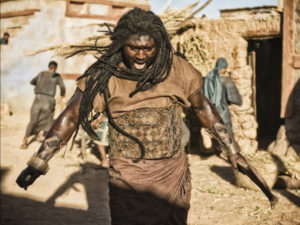 More cruelty, violence and killing in the Old Testament.
More cruelty, violence and killing in the Old Testament.
 Then seeing that he had discovered to her all his mind… for now he hath opened his heart to me… and forthwith pulled his eyes out, and led him bound in chains to Gaza, and shutting him up in prison made him grind
Then seeing that he had discovered to her all his mind… for now he hath opened his heart to me… and forthwith pulled his eyes out, and led him bound in chains to Gaza, and shutting him up in prison made him grind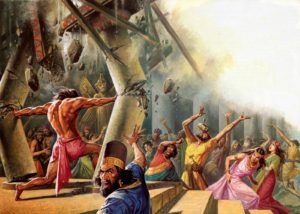 Another grisly story of the Old Testament but one that clearly shows us how to pray to God to remember and restore us to our best self. Or more realistically, in today’s world, to take us to new heights so that we can become the best-ever version of our self!
Another grisly story of the Old Testament but one that clearly shows us how to pray to God to remember and restore us to our best self. Or more realistically, in today’s world, to take us to new heights so that we can become the best-ever version of our self!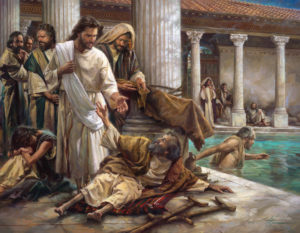 Jesus’ miracle curing the paralytic, who had lived thirty-0eight years under his infirmity, on the Sabbath in the pool at Bethsaida was what we would call today “the tipping point between his ministry and the authority of the Jewish leaders.
Jesus’ miracle curing the paralytic, who had lived thirty-0eight years under his infirmity, on the Sabbath in the pool at Bethsaida was what we would call today “the tipping point between his ministry and the authority of the Jewish leaders. His words concerning judgment and who does the judgment (God or Jesus?) and when (in real time living or after our death?).
His words concerning judgment and who does the judgment (God or Jesus?) and when (in real time living or after our death?). Jesus: “For as the Father has life in himself, even so he has given to the Son also to have life in himself; and he has granted him power to render judgment, because he is the Son of Man.”
Jesus: “For as the Father has life in himself, even so he has given to the Son also to have life in himself; and he has granted him power to render judgment, because he is the Son of Man.”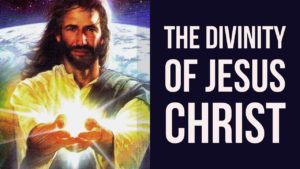 Jesus: “I do not receive glory from men. How can you believe who receive glory from one another, and do not seek the glory which is from the only God?”
Jesus: “I do not receive glory from men. How can you believe who receive glory from one another, and do not seek the glory which is from the only God?” Jesus again challenge the authority of the Jewish leaders: “But if you do not believe Moses’ writings, how will you believe my words?”
Jesus again challenge the authority of the Jewish leaders: “But if you do not believe Moses’ writings, how will you believe my words?”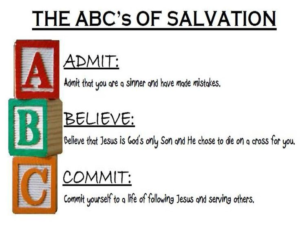 A miracle led into the Divinity of the Father and Son; God and Christ!
A miracle led into the Divinity of the Father and Son; God and Christ!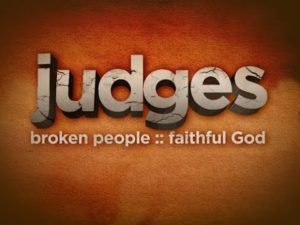 This tale of ‘so heinous a crime, an incredible fury of lust, ever committed in Israel’ began back in Chapter 29:
This tale of ‘so heinous a crime, an incredible fury of lust, ever committed in Israel’ began back in Chapter 29: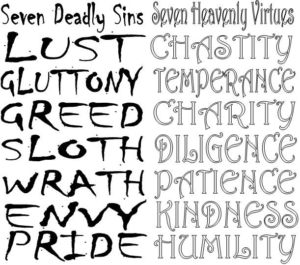 Came to the door of the house where her lord lodged, and there fell down… He thinking she was taking her rest, said to her: Arise, and let us be going…
Came to the door of the house where her lord lodged, and there fell down… He thinking she was taking her rest, said to her: Arise, and let us be going…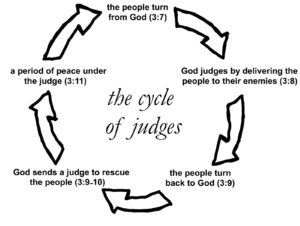 The revenge was as brutal and savage against the city of Gabaa where the offenders lived and the entire tribe of Benjamin because they would not give up the criminals as requested by other eleven tribes of Israel—who met together in the assembly of the people of God, four hundred thousand footmen fit for war.
The revenge was as brutal and savage against the city of Gabaa where the offenders lived and the entire tribe of Benjamin because they would not give up the criminals as requested by other eleven tribes of Israel—who met together in the assembly of the people of God, four hundred thousand footmen fit for war.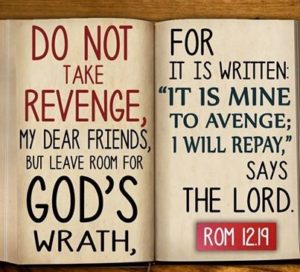 Shall I go out any more to fight against the children of Benjamin my brethren or not? And he (the Lord) answered them: Go up against them, and join battle.
Shall I go out any more to fight against the children of Benjamin my brethren or not? And he (the Lord) answered them: Go up against them, and join battle.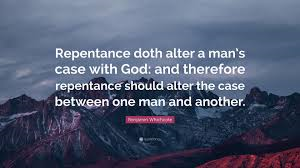 O Lord God of Israel, why is so great an evil come to pass in thy people, that this day one tribe should be taken away from among us?
O Lord God of Israel, why is so great an evil come to pass in thy people, that this day one tribe should be taken away from among us?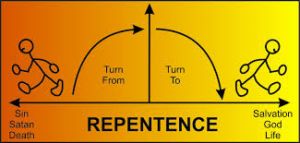 And all of Israel was very sorry, and repented for the destroying of one tribe out of Israel.
And all of Israel was very sorry, and repented for the destroying of one tribe out of Israel.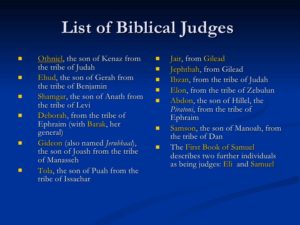
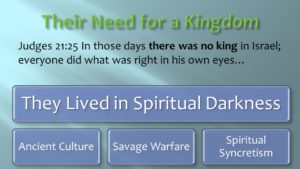
 I do see an evolution of humankind though. From a brutal seemingly lawless tribal society into some sort of organized and mutually beneficial society all the doings of an emerging merciful and compassionate God.
I do see an evolution of humankind though. From a brutal seemingly lawless tribal society into some sort of organized and mutually beneficial society all the doings of an emerging merciful and compassionate God.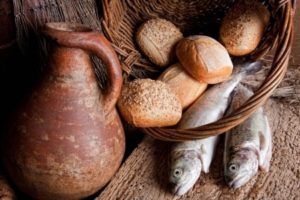 A familiar story indeed, Jesus multiplying loaves of bread and fish to feed five thousand people, but how familiar is it or will it be in our own personal lives?
A familiar story indeed, Jesus multiplying loaves of bread and fish to feed five thousand people, but how familiar is it or will it be in our own personal lives? But where have we taken a few crumbs and maybe a stinking fish or two and made something of it with our lives?
But where have we taken a few crumbs and maybe a stinking fish or two and made something of it with our lives? No one needs to be a king of anything. Jesus certainly realized this and did not stray from His divine destiny.
No one needs to be a king of anything. Jesus certainly realized this and did not stray from His divine destiny.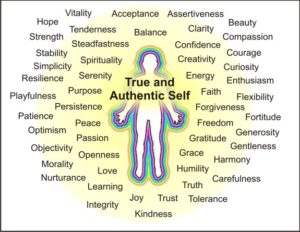 We can’t be perfect. We can’t be in control of everything. We can’t think in all-or-nothing terms and we can’t be judgmental to be eligible for eternal life. We simply must believe and as Jesus says—“No one can come to me unless the Father who sent me draw him, and I will raise him up on the last day.” The Father draws us near even though we may be trying to draw near to Him. Ultimately it is out of our control to secure everlasting life by ourselves, our thoughts, our words, and our actions.
We can’t be perfect. We can’t be in control of everything. We can’t think in all-or-nothing terms and we can’t be judgmental to be eligible for eternal life. We simply must believe and as Jesus says—“No one can come to me unless the Father who sent me draw him, and I will raise him up on the last day.” The Father draws us near even though we may be trying to draw near to Him. Ultimately it is out of our control to secure everlasting life by ourselves, our thoughts, our words, and our actions. Jesus: “My time has not yet come, but your time is always at hand. The world cannot hate you, but it hates me because I bear witness concerning it, that its works are evil. As for you, go up to the feast, but I do not go up to this feast, for my time is not yet fulfilled.”
Jesus: “My time has not yet come, but your time is always at hand. The world cannot hate you, but it hates me because I bear witness concerning it, that its works are evil. As for you, go up to the feast, but I do not go up to this feast, for my time is not yet fulfilled.”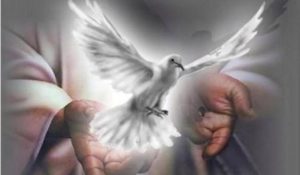 Jesus: “Yet a little while I am with you, and then I go to him who sent me. You will seek me and will not find me; and where I am you cannot come.”
Jesus: “Yet a little while I am with you, and then I go to him who sent me. You will seek me and will not find me; and where I am you cannot come.” Nicodemus: “Does our Law judge a man unless it first give him a hearing, and know what he does?”
Nicodemus: “Does our Law judge a man unless it first give him a hearing, and know what he does?”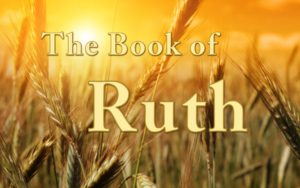 This Bible Book is the beautiful story of the young Gentile widow Ruth, who went with Noemi, her mother-in-law, to Bethlehem. There she met and married Booz, a Jew. From that marriage was born Obed, the grandfather of David. Thus Christ, who was of the family of David, had Gentile ancestors.
This Bible Book is the beautiful story of the young Gentile widow Ruth, who went with Noemi, her mother-in-law, to Bethlehem. There she met and married Booz, a Jew. From that marriage was born Obed, the grandfather of David. Thus Christ, who was of the family of David, had Gentile ancestors. I witnessed the ‘All from One, Unity Amid Diversity’ exhibit while visiting South Africa in January, 2016. I found it fascinating, educational, and revealing as much as the Book of Ruth.
I witnessed the ‘All from One, Unity Amid Diversity’ exhibit while visiting South Africa in January, 2016. I found it fascinating, educational, and revealing as much as the Book of Ruth.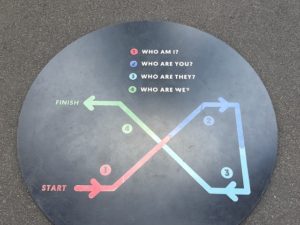 We are all one people because we come from one people.
We are all one people because we come from one people.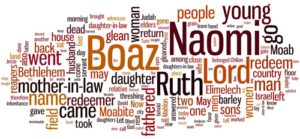 He was named Elimelech, and his wife, Noemi: and his two sons, the one Mahalon, and the other Chelion, Ephrathites of Bethlehem Juda.
He was named Elimelech, and his wife, Noemi: and his two sons, the one Mahalon, and the other Chelion, Ephrathites of Bethlehem Juda.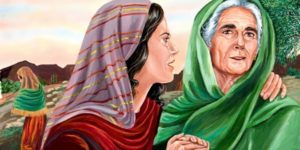 Ruth stuck close to her mother-in-law.
Ruth stuck close to her mother-in-law.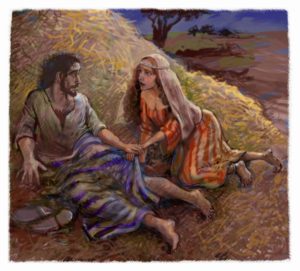 Booz to Ruth: Fear not therefore, but whatsoever thou shalt say to me I will do to thee.
Booz to Ruth: Fear not therefore, but whatsoever thou shalt say to me I will do to thee.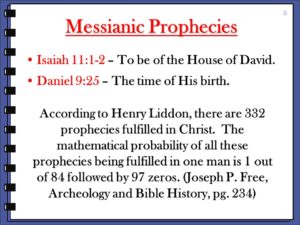

 Gospel of Saint John, Chapter 8, a chapter of sin… and freedom proposed, almost explained but certainly guaranteed!
Gospel of Saint John, Chapter 8, a chapter of sin… and freedom proposed, almost explained but certainly guaranteed! Is the worse sin of all suicide? I don’t know, not mine to judge but like a natural death there is isolation with suicide and no more human ability to interact, to love one another as we know love to be. Perhaps the worse sin of all is a self-inflicted sense of isolation, while we are still living, with no love present either in the giving or the receiving. That would be and is tragic for so many people, myself included at desperate, thankfully brief moments in my life. Let desperation pass and let your recovery and return back to a full life begin with you as the song ‘Let there be peace on earth’ I sung as a child rings true to me—“and let it begin with me…” Make peace with yourself, please!
Is the worse sin of all suicide? I don’t know, not mine to judge but like a natural death there is isolation with suicide and no more human ability to interact, to love one another as we know love to be. Perhaps the worse sin of all is a self-inflicted sense of isolation, while we are still living, with no love present either in the giving or the receiving. That would be and is tragic for so many people, myself included at desperate, thankfully brief moments in my life. Let desperation pass and let your recovery and return back to a full life begin with you as the song ‘Let there be peace on earth’ I sung as a child rings true to me—“and let it begin with me…” Make peace with yourself, please!  Want to come out of isolation? Jesus, himself could do nothing, accomplish nothing, without his relationship to God, his Father. Not only can we emerge from isolation, it is possible, very probable, 100% guaranteed with Christ that we will never be alone again in this world or the next.
Want to come out of isolation? Jesus, himself could do nothing, accomplish nothing, without his relationship to God, his Father. Not only can we emerge from isolation, it is possible, very probable, 100% guaranteed with Christ that we will never be alone again in this world or the next.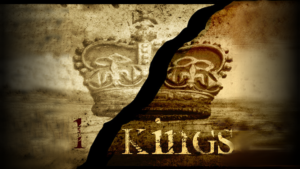 The First Book of Kings—this and the following Book are also called the Books of Samuel, because they tell of Samuel and the two kings, Saul and David, whom he anointed. After the history of Heli and Samuel, the last of the Judges, this book records the beginning of the Jewish monarchy and the rule of the first king, Saul.
The First Book of Kings—this and the following Book are also called the Books of Samuel, because they tell of Samuel and the two kings, Saul and David, whom he anointed. After the history of Heli and Samuel, the last of the Judges, this book records the beginning of the Jewish monarchy and the rule of the first king, Saul.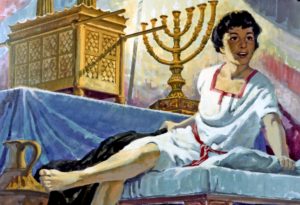 Anna conceived and bore a son, and called his name Samuel: because she had asked him of the Lord.
Anna conceived and bore a son, and called his name Samuel: because she had asked him of the Lord. Again, again the third time, and the Lord came and stood; and he called, as he had called the other times: Samuel, Samuel.
Again, again the third time, and the Lord came and stood; and he called, as he had called the other times: Samuel, Samuel. Heli to Samuel: What is the word that the Lord hath spoken to thee? I beseech thee hide it not from me.
Heli to Samuel: What is the word that the Lord hath spoken to thee? I beseech thee hide it not from me.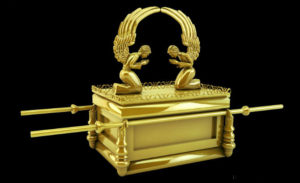 Let us fetch unto us the ark of the covenant of the Lord from Silo, and let it come in the midst of us, that it may save us from the hand of our enemies.
Let us fetch unto us the ark of the covenant of the Lord from Silo, and let it come in the midst of us, that it may save us from the hand of our enemies.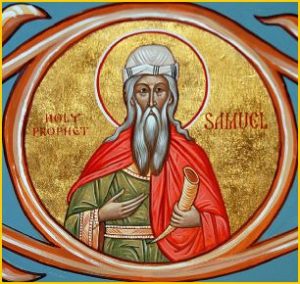 Heli: For his heart was fearful for the ark of God. Now Heli was ninety and eight years old… he fell from his stool backwards by the door, and broke his neck, and died. For he was an old man, and far advanced in years: and he judged Israel forty years.
Heli: For his heart was fearful for the ark of God. Now Heli was ninety and eight years old… he fell from his stool backwards by the door, and broke his neck, and died. For he was an old man, and far advanced in years: and he judged Israel forty years.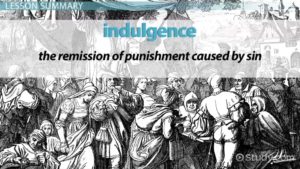 If you send back the ark of the God of Israel, send it not away empty, but render unto him what you owe for sin, and then you shall be healed: and you shall know why his hand departeth not from you.
If you send back the ark of the God of Israel, send it not away empty, but render unto him what you owe for sin, and then you shall be healed: and you shall know why his hand departeth not from you.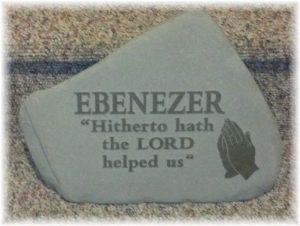 And they said to Samuel: Cease not to cry to the Lord our God for us, that he may save us out of the hand of the Philistines… the Philistines began the battle against Israel: but the Lord thundered with a great thunder on that day upon the Philistines, and terrified them, and they were overthrown before the face of Israel.
And they said to Samuel: Cease not to cry to the Lord our God for us, that he may save us out of the hand of the Philistines… the Philistines began the battle against Israel: but the Lord thundered with a great thunder on that day upon the Philistines, and terrified them, and they were overthrown before the face of Israel. Jesus gives sight to a man blind from birth and uses the miracle to enlighten us on His law based on love. This is a drastically different perspective and reality than the Old Testament way, Moses’ way, based on law. This incorrect judgment is why He was sent into the world. To detect these sins of judgment, the basic sin of judging others, is really what blindness to the New Testament of Love is all about.
Jesus gives sight to a man blind from birth and uses the miracle to enlighten us on His law based on love. This is a drastically different perspective and reality than the Old Testament way, Moses’ way, based on law. This incorrect judgment is why He was sent into the world. To detect these sins of judgment, the basic sin of judging others, is really what blindness to the New Testament of Love is all about.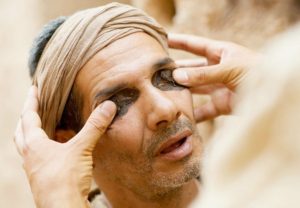 This parable goes even deeper with the man of age whose sight has come to him for the first time challenging the Pharisees directly.
This parable goes even deeper with the man of age whose sight has come to him for the first time challenging the Pharisees directly.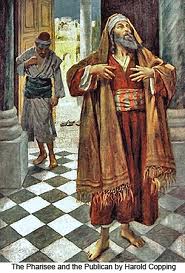 Pharisees: “Thou wast altogether born in sins, and thou dost teach us?
Pharisees: “Thou wast altogether born in sins, and thou dost teach us?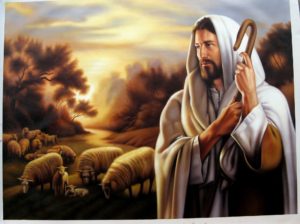 Jesus again: “Amen, amen, I say to you. I am the door of the sheep. All whoever have come are thieves and robbers; but the sheep have not heard them. I am the door. If anyone enter by me he shall be safe, and shall go in and out, and shall find pastures. The thief comes only to steal, and slay, and destroy. I came that they may have life, and have it more abundantly.”
Jesus again: “Amen, amen, I say to you. I am the door of the sheep. All whoever have come are thieves and robbers; but the sheep have not heard them. I am the door. If anyone enter by me he shall be safe, and shall go in and out, and shall find pastures. The thief comes only to steal, and slay, and destroy. I came that they may have life, and have it more abundantly.”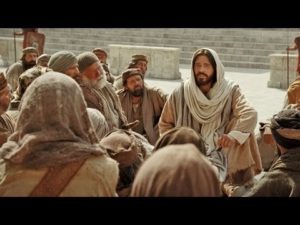 Jesus: “I tell you and you do not believe. The works that I do in the name of my Father, these bear witness concerning me. But you do not believe because you are not my sheep. My sheep hear my voice, and I know them, and they follow me. And I give them everlasting life: and they shall never perish, neither shall anyone snatch them out of my hand. What my Father has given me is greater than all, and no one is able to snatch anything out of the hand of the Father. I and the Father are one.”
Jesus: “I tell you and you do not believe. The works that I do in the name of my Father, these bear witness concerning me. But you do not believe because you are not my sheep. My sheep hear my voice, and I know them, and they follow me. And I give them everlasting life: and they shall never perish, neither shall anyone snatch them out of my hand. What my Father has given me is greater than all, and no one is able to snatch anything out of the hand of the Father. I and the Father are one.” They sought therefore to seize him; and he went forth out of their hands.
They sought therefore to seize him; and he went forth out of their hands. We all want freedom in the outside world. Sometimes difficult to achieve, sometimes easy to lose.
We all want freedom in the outside world. Sometimes difficult to achieve, sometimes easy to lose.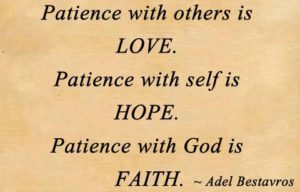 Or be happening… Samuel could see the big picture. Why go for a new relationship with a king? Why not repair the existing relationship with God? Why go down a road that the best case is bondage? Why not begin a spiritual journey the will result in unlimited peace, joy, unity, and freedom; guaranteed?
Or be happening… Samuel could see the big picture. Why go for a new relationship with a king? Why not repair the existing relationship with God? Why go down a road that the best case is bondage? Why not begin a spiritual journey the will result in unlimited peace, joy, unity, and freedom; guaranteed?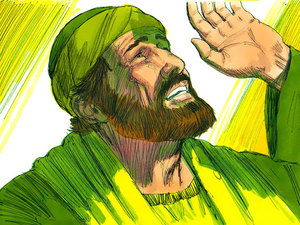 Lord to Samuel: “Hearken to their voice, and make them a king.
Lord to Samuel: “Hearken to their voice, and make them a king.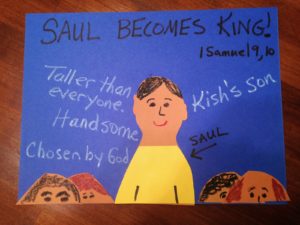 So when Saul turned his back to go from Samuel, God gave unto him another heart… and the spirit of the Lord came upon him, and he prophesied in the midst of them… therefore it became a proverb: Is Saul also among the prophets?
So when Saul turned his back to go from Samuel, God gave unto him another heart… and the spirit of the Lord came upon him, and he prophesied in the midst of them… therefore it became a proverb: Is Saul also among the prophets? The spirit of the Lord came upon Saul… follow Saul and Samuel… the fear of the Lord fell upon the people… children of Israel three hundred thousand… men of Juda thirty thousand… and he slew the Ammonites… and the rest were scattered so that two of them were not left together.
The spirit of the Lord came upon Saul… follow Saul and Samuel… the fear of the Lord fell upon the people… children of Israel three hundred thousand… men of Juda thirty thousand… and he slew the Ammonites… and the rest were scattered so that two of them were not left together. Samuel: Fear not, you have done all this evil: but yet depart not from following the Lord, but serve the Lord with all your heart.
Samuel: Fear not, you have done all this evil: but yet depart not from following the Lord, but serve the Lord with all your heart.